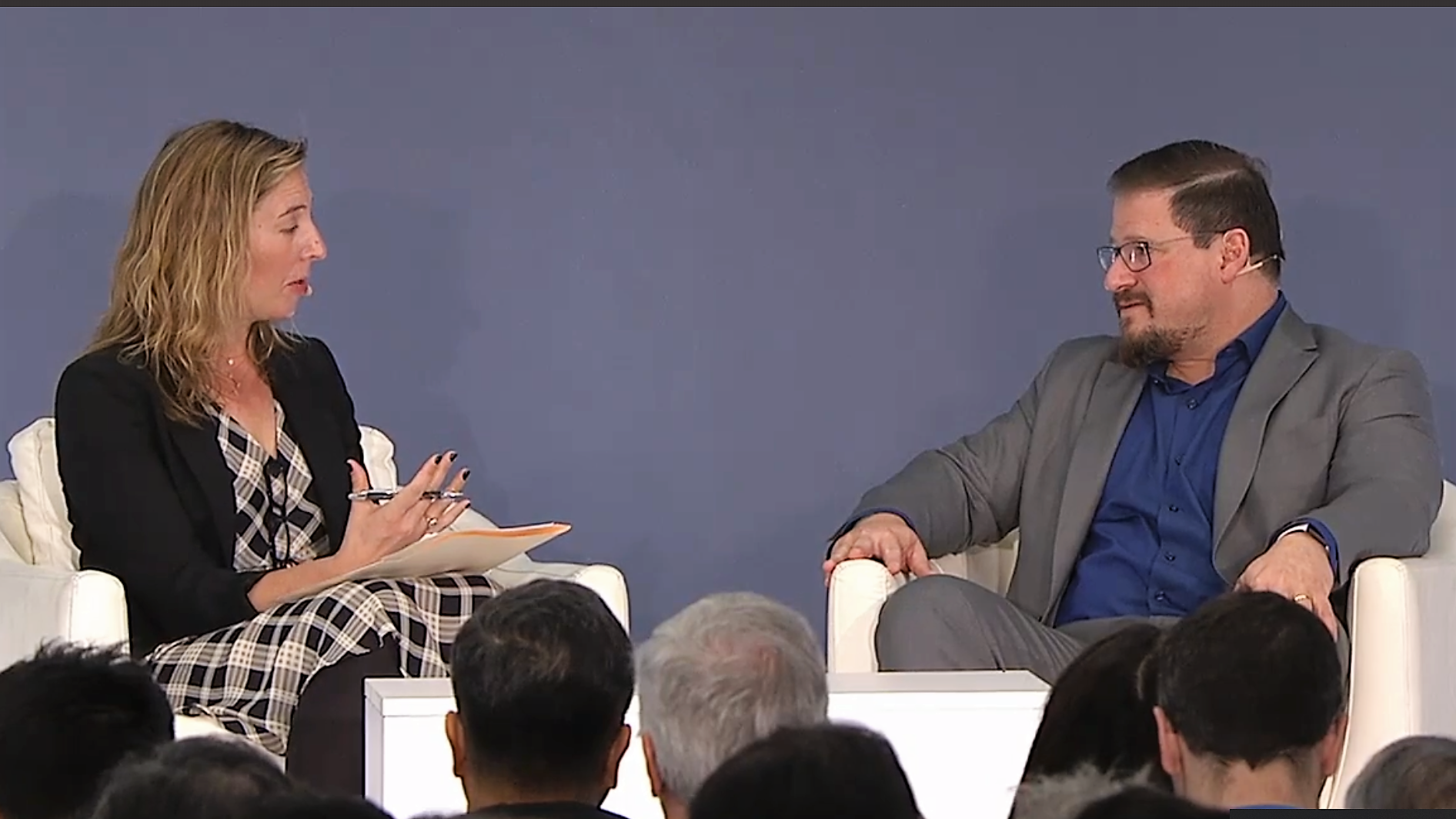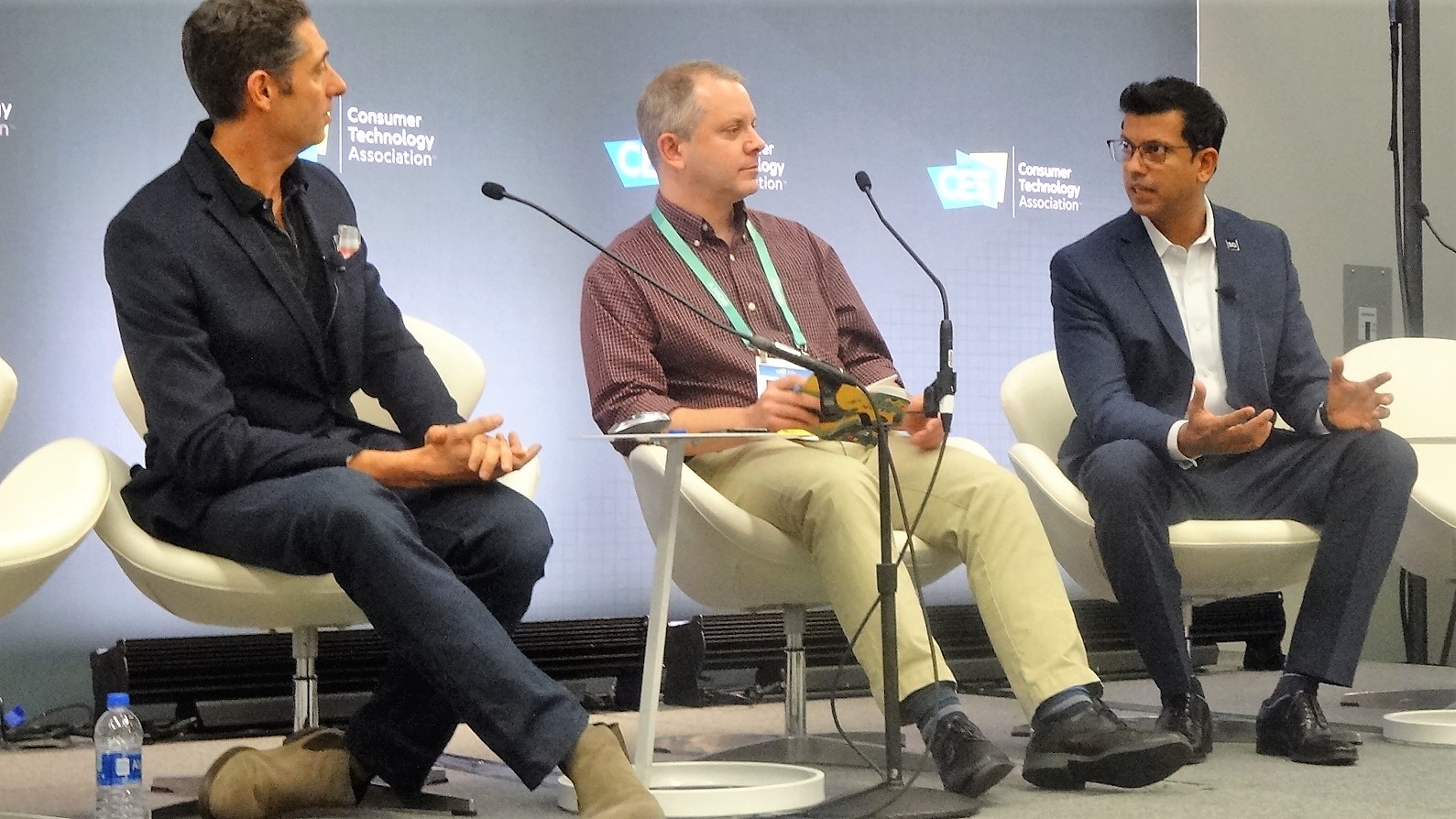Commentary
Will 2020 be the breakout year for 5G?
5G cellular service has been introduced to several markets, but use is limited due to the need for consumers to have compatible phones. Experts, nonetheless, expect big change is on the way, especially in ways that affect IoT devices and retail.

January 20, 2020 by Elliot Maras — Editor, Kiosk Marketplace & Vending Times
With automation making inroads in many aspects of our daily lives, the newly introduced 5G cellular technology is destined to play a big role in how things get done. As this more powerful cellular technology expands, many experts think the pace of innovation of connected devices will accelerate.
 |
Cristiano Amon of Qualcomm Inc., discusses 5G with Molly Wood, host of NPR’s Marketplace Tech show during CES in Las Vegas. Photo courtesy of CES. |
But the "big change" that has been discussed at conferences for two years hasn't yet taken effect. Some people think 5G has been over-hyped.
Speakers at the recent CES show in Las Vegas acknowledged the frustration that has followed the hype, but this hasn't tarnished their optimism.
One of 5G's most important distinctions is that it enables other technologies, such as IoT, video streaming, augmented reality and immersive gaming — areas that can improve the retail customer experience.
In addition, the ability to deliver faster and more reliable mobile connectivity holds significant potential for self-service technology. As mobile commerce expands, so does the need for shopping and order fulfillment options, such as endless aisle kiosks and BOPIS lockers.
But when will 5G "arrive"?
Where we are today
In the last year, T-Mobile, AT&T and Sprint have introduced 5G service in several markets nationwide, and technology observers generally expect the pace to accelerate.
But even in markets where the service has been introduced, most consumers cannot use it since they don't own 5G-compatible phones. Consumers are holding on to their existing phones longer, and 5G phones are expensive. As with any new technology, large-scale adoption is needed for prices to come down.
During a CES presentation, Cristiano Amon, president of Qualcomm Inc., a wireless communications equipment provider, said 2018 was a year of testing and development while 2019 was the year of service launches in the U.S., Europe, Asia and Australia.
"2020 is the year it will scale," he said.
What it means to retail
Many of the 5G applications that Amon cited will benefit retail customer experience. The most immediate impact in his view will be on live streaming video, a technology that depends on reliable connectivity.
"Video is going to be the thing of 5G," he said. "We'll finally deliver on user content generation. Everyone will become kind of a broadcaster; you have the speed to deliver high quality video to the cloud."
It will also enable mobile gaming by taking it "mainstream," he said.
"It (gaming) is going to go from console to mobile devices," Amon said.
Wearable devices that connect consumers to experiential media will also benefit. Amon said there will be wearable devices that look like eye glasses that have cameras that connect the user to experiential media, such as augmented reality.
 |
Jason Elliott of Nokia, Rob Pegoraro of Yahoo Finance and Arvin Singh of Verizon discuss 5G at CES. Photo courtesy of Networld Media Group. |
"5G is no longer an exclusive technology of the wireless sector," he said. "5G is part of the automotive industry conversation. It's part of the IoT conversation. It's part of the computing conversation. It's part of the cloud conversation."
During another CES session, Jason Elliott, 5G market development director at Nokia, also said that 5G will create a new paradigm. One of the most significant impacts on retail in his view will be more opportunity to use augmented reality.
What it means to the future
More important than all of this, according to Amon and other industry leaders, is what the world will look like once 5G use becomes widespread, which Amon thinks could be within a few years. Amon and many others believe 5G will bring further-reaching change than just faster data transfer.
Panelists at another CES session called it a "fourth industrial revolution." They pointed to the fact that 5G's predecessor, 4G, ushered in the mobile commerce and social media revolutions that have changed business models and initiated new cultural norms.
What those longer-term changes will be can only be guessed at the present time. Meanwhile, experts are excited by the fact that so many technology companies are developing 5G products compared to where 4G was at a similar stage of development.
About Elliot Maras
Elliot Maras is the editor of Kiosk Marketplace and Vending Times. He brings three decades covering unattended retail and commercial foodservice.
 ChatGPT
ChatGPT Grok
Grok Perplexity
Perplexity Claude
Claude









